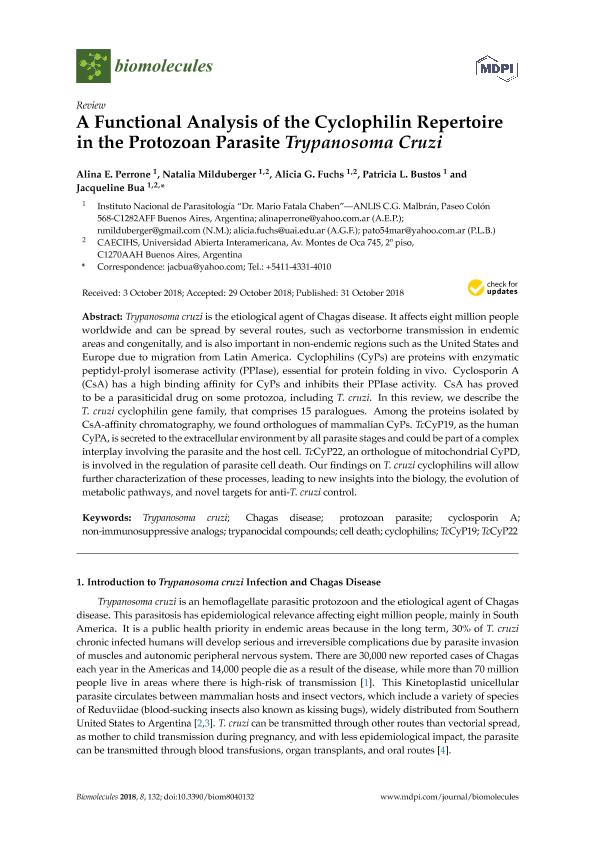Artículo
A functional analysis of the cyclophilin repertoire in the protozoan parasite trypanosoma cruzi
Perrone, Alina Elizabeth ; Milduberger, Natalia Ayelen
; Milduberger, Natalia Ayelen ; Fuchs, Alicia Graciela; Bustos, Patricia Laura
; Fuchs, Alicia Graciela; Bustos, Patricia Laura ; Bua, Jacqueline Elena
; Bua, Jacqueline Elena
 ; Milduberger, Natalia Ayelen
; Milduberger, Natalia Ayelen ; Fuchs, Alicia Graciela; Bustos, Patricia Laura
; Fuchs, Alicia Graciela; Bustos, Patricia Laura ; Bua, Jacqueline Elena
; Bua, Jacqueline Elena
Fecha de publicación:
10/2018
Editorial:
MDPI AG
Revista:
Biomolecules
ISSN:
2218-273X
Idioma:
Inglés
Tipo de recurso:
Artículo publicado
Clasificación temática:
Resumen
Trypanosoma cruzi is the etiological agent of Chagas disease. It affects eight million people worldwide and can be spread by several routes, such as vectorborne transmission in endemic areas and congenitally, and is also important in non-endemic regions such as the United States and Europe due to migration from Latin America. Cyclophilins (CyPs) are proteins with enzymatic peptidyl-prolyl isomerase activity (PPIase), essential for protein folding in vivo. Cyclosporin A (CsA) has a high binding affinity for CyPs and inhibits their PPIase activity. CsA has proved to be a parasiticidal drug on some protozoa, including T. cruzi. In this review, we describe the T. cruzi cyclophilin gene family, that comprises 15 paralogues. Among the proteins isolated by CsA-affinity chromatography, we found orthologues of mammalian CyPs. TcCyP19, as the human CyPA, is secreted to the extracellular environment by all parasite stages and could be part of a complex interplay involving the parasite and the host cell. TcCyP22, an orthologue of mitochondrial CyPD, is involved in the regulation of parasite cell death. Our findings on T. cruzi cyclophilins will allow further characterization of these processes, leading to new insights into the biology, the evolution of metabolic pathways, and novel targets for anti-T. cruzi control.
Archivos asociados
Licencia
Identificadores
Colecciones
Articulos(SEDE CENTRAL)
Articulos de SEDE CENTRAL
Articulos de SEDE CENTRAL
Citación
Perrone, Alina Elizabeth; Milduberger, Natalia Ayelen; Fuchs, Alicia Graciela; Bustos, Patricia Laura; Bua, Jacqueline Elena; A functional analysis of the cyclophilin repertoire in the protozoan parasite trypanosoma cruzi; MDPI AG; Biomolecules; 8; 4; 10-2018; 1-9
Compartir
Altmétricas



